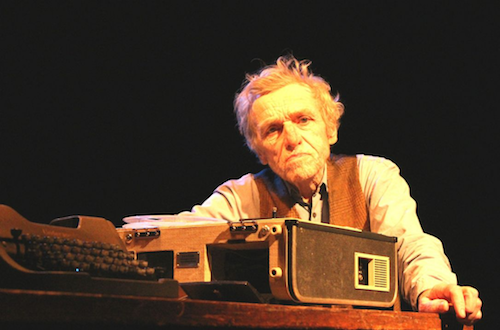
Toronto’s Theatre Passe Muraille revives their production of Samuel Beckett’s play for its 50th season
Making it to 50 is a huge milestone for anyone, particularly a theatre company. To celebrate its 50th anniversary this year, Theatre Passe Muraille brings Samuel Beckett’s Krapp’s Last Tape back to the stage, remounting the popular Singing Swan production co-produced by VideoCabaret.
Instead of his 50th, Krapp is celebrating his 69th year, and from actor Bob Nasmith’s deliberate overemphasis of the haggardness and frailty of his visage, it’s a hard-living 69. When the curtain – rarely used in the small Backspace, but necessary to preserve the reveal of a dusty jewel box of a small period set (Chris Clifford) – rises, he is setting up to review a tape he made when he turned 39. Like a Russian nesting doll of reflection, that tape also contains a review of a tape made when he was in his twenties.
The theme of aging and changing perspectives suffuses the play, a commentary on the near-inability of self-awareness at one’s current age. In hindsight, however, it’s easier to see the foibles. As much as we may look back on our decisions a decade ago and think, “Was I ever that young?” it’s hard to comprehend that the self of a decade from now will be saying the same thing about the present.
Nasmith ably portrays incredulous anger, humour, wistfulness and regret at turns, even in silence, as he spends long stretches listening to and rewinding the tape. All told, despite the occasional moment of reported connection with other human beings, Krapp seems to have lived a life where recording and listening to his own voice was more important than building long-lasting relationships. While he derides the pomposity and idealism of his former selves, respectively, it’s with the cynicism of a man for whom nothing has gone as planned. His literary venture was a failure, he dozes off in church when he rarely attends, and his only visitor is a prostitute.
Despite Krapp’s remove as a character, Nasmith’s expressive stage presence and masterful control makes it easy to connect with him and even take comfort in his silence. Occasionally, he retreats into an offstage kitchen, where corks pop and bottles open, but director Mac Fyfe primarily has him sit as far downstage as possible at his desk. This leads to a lot of direct eye contact between Nasmith and the audience, making it difficult to remain uninvolved or to fail to contemplate one’s own mortality.
We watch Nasmith do a lot of silent, reverent listening to his past, caught up in a moment. A description of a love affair makes him stop and rewind, but he only responds to a passage about his mother’s death to look up the word “viduity,” the definition of which he’s forgotten in the intervening years.
Nasmith combines these slow, painstaking moments of slack-jawed reflection, his lips drawn back to create almost a death mask, with entertaining slapstick, derived from the character’s obsession with eating bananas. When he speaks, he plays with language and sound, such as the delight he conveys at impossibly lengthening the word “spool.” He even breaks the fourth wall in dropping banana peels off the front of the stage, to the amusement of the audience; when that line is crossed, it always feels like anything can happen.
There’s a lot of possibility in silence, and even more in time. Krapp’s Last Tape is a slim 40 minutes long, but in it, we see an entire life: lived, wasted, contemplated, even celebrated.
Details:
- Krapp’s Last Tape plays until October 21 in the Theatre Passe Muraille Backspace (16 Ryerson Ave.)
- Shows run from Tuesday-Saturday at 7:30PM, and Saturday-Sunday at 2:00PM.
- Tickets are PWYC (Sundays)-$30, and can be purchased in person, online, or by calling the Arts Box Office at 416-504-7529.
Photo of Bob Nasmith provided by the company
